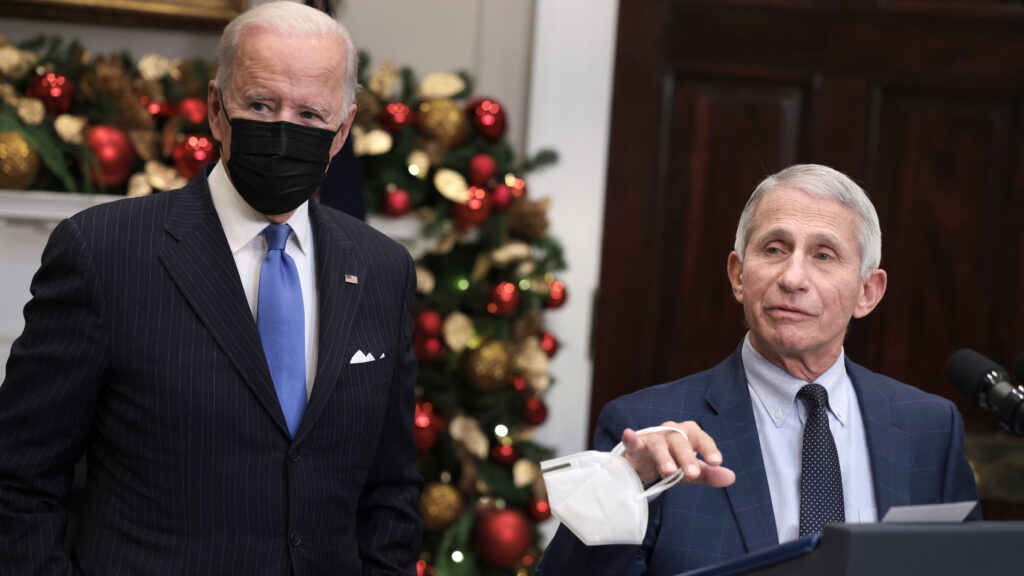WASHINGTON — President Biden preemptively pardoned former top infectious disease official Anthony Fauci on Monday, showing how divisive the country’s Covid-19 response and aftermath remain even after the pandemic’s end.
Biden also pardoned retired Gen. Mark Milley and members and staff of the House committee that investigated the Jan. 6 attacks on the Capitol.
advertisement
“The issuance of these pardons should not be mistaken as an acknowledgment that any individual engaged in any wrongdoing, nor should acceptance be misconstrued as an admission of guilt for any offense,” Biden said in a statement. “Our nation owes these public servants a debt of gratitude for their tireless commitment to our country.”
The highly unusual move protects Fauci, who retired as director of the National Institutes of Allergy and Infectious Diseases in 2022, from any potential charges brought by the incoming Trump administration. It comes amid calls from some Trump supporters and congressional Republicans to charge Fauci with perjury or misconduct over the government’s handling of the Covid-19 response. Fauci has not been charged with any crime.
In his statement, Biden said he believes the legal process will prevail over politics, but that even being investigated or prosecuted can put a heavy burden on individuals.
advertisement
“These are exceptional circumstance, and I cannot in good conscience do nothing,” he said.
Trump’s pick to lead the Health and Human Services Department, Robert F. Kennedy Jr., said in 2023 that he would prosecute Fauci “if there were crimes he committed.” RFK Jr. has accused Fauci of profiting from the pandemic and helping fuel a rise in chronic illnesses, but has not said what he believes Fauci could be charged with.
Fauci has become something of a bogeyman on the right, and receives federal protection because he frequently gets death threats. Elon Musk, who Trump tapped to lead a government efficiency initiative, has tweeted “My pronouns are Prosecute/Fauci” several times this year. Trump himself has not said that he would pursue charges against Fauci.
The former official told CNN‘s Jim Acosta he was “grateful” for Biden’s pardon and that the White House had previously expressed concern about threats against Fauci and his family.
“I have been the subject of politically motivated threats of investigation and prosecution. There is absolutely no basis for these threats” that have caused “immeasurable and intolerable distress for me and my family,” Fauci said in a statement shared with STAT.
It is relatively rare to charge a government official with perjury. Congress impeached former President Clinton on charges including perjury and nearly impeached former President Nixon for perjury before he resigned from office. His successor Gerald Ford preemptively pardoned Nixon from future charges.
Biden in early December pardoned his son Hunter from federal tax and gun charges, reversing course from earlier promises that he would not do so. Separately, he also commuted a record number of sentences on Dec. 12 and pardoned 38 people convicted of nonviolent crimes.
Sen. Rand Paul (R-Ky.), who now leads the Senate Homeland Security and Governmental Affairs Committee, has suggested that Fauci could be charged with perjury based on his testimony to congressional panels about the Covid emergency response and the virus’ origins. Paul plans to investigate the virus’ origins and the National Institutes of Health’s handling of infectious disease research.
advertisement
Paul and others argue that Fauci dismissed theories that the virus leaked from the Wuhan Institute of Virology, and denied funding controversial research at the lab. The former infectious disease official downplayed a potential lab leak in the early months of the pandemic, but in more recent testimony said it was possible.
Paul criticized the pardon on Monday and pledged to continue investigating Fauci. “I will not rest until the entire truth of the coverup is exposed,” he wrote on X.
“I don’t think the concept of there being a lab leak is inherently a conspiracy theory,” Fauci said in June. A GOP-led congressional committee on the coronavirus pandemic concluded in its final report in December that the virus most likely came from a lab leak. Democrats’ report said a lab leak is “plausible” but that the committee’s investigation did not definitively prove anything.
Fauci has also testified that the NIH did not fund controversial gain-of-function studies at the Wuhan lab. The House Select Subcommittee on the Coronavirus Pandemic investigated coronavirus research by the EcoHealth Alliance, and both Republicans and Democrats found that the nonprofit delayed reporting high-risk research to regulators. The Health and Human Services Department last May barred EcoHealth from receiving future federal funds.
Congressional Republicans and incoming Trump officials have also criticized Fauci for early comments in the pandemic about masking, social distancing, and shutdown policies.
In particular, Fauci in March 2020 told “60 Minutes” that “there’s no reason to be walking around with a mask.” The Centers for Disease Control and Prevention first recommended that the general public wear masks in April 2020.
Fauci’s 2020 comments were in line with other health officials at the time. Republicans leading the House committee acknowledged early changes in mask guidance in their final report this December, writing that it was “understandable” as “public health officials were working with the limited information they had on hand.” They criticized later masking requirements under the Biden administration.
advertisement
RFK Jr. has maintained pressure on Fauci in his retirement. His campaign team, in a mass-emailed plea for donations in December, blasted Fauci for receiving federally funded security.
Fauci joined NIAID as an HIV researcher and took over as director in 1984. He led the agency for 38 years through multiple infectious disease outbreaks. President George W. Bush awarded him the Presidential Medal of Freedom for his work on the global HIV/AIDS program PEPFAR.
When he retired in 2022, Fauci said he would mentor young scientists and work on his writing. He published a memoir, “On Call,” in June 2024.

